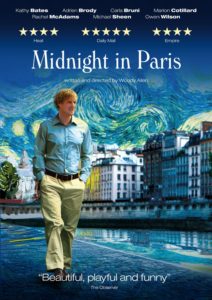 Script Clearance Warning: Midnight in Paris Edition
Script Clearance Warning: Midnight in Paris Edition
If you’re not sure how vital script clearance is to the success of your film project, look no further than Woody Allen’s Midnight in Paris.
One line in the script led to a damaging lawsuit—one that might have been avoided with professional script clearance.
You hear the term “frivolous lawsuit” often thrown around. While the validity of court claims are up for debate, there’s no question that creative works are more susceptible to legal entanglements than almost anything else.
The Midnight in Paris case might be classified under the frivolous lawsuit umbrella. After all, only one sentence in the script could have halted production and distribution of the film.
We’re not talking about a copyright claim over a character or a right of publicity claim from the use of a celebrity’s likeness. It was only a few words that created enough merit for a film lawsuit.
The William Faulkner estate sued the filmmakers in light of a single quote, a mere eight words taken from the pages of a short novel.
In the story Requiem for a Nun, Faulkner waxes poetic with a line that summed up the main point: “The past is never dead. It’s not even past.”
Why eight words created a lawsuit.

Even experienced professionals are subject to litigation risk.
Keep in mind that the script chronicled fictional accounts of several real-life artists and writers—F. Scott Fitzgerald, Ernest Hemingway, Gertrude Stein, Pablo Picasso, and Salvador Dali, among other iconic figures.
You’d think, given that this fictional film features actual human beings, every legal precaution would be put in place. How could eight words give the William Faulkner estate a legal leg to stand on?
According to the plaintiff, the quote summed up the entire novel. Thus, the movie piggy-backed off the theme. Be that as it may, the judge ruled clearly in favor of Woody Allen and his production house.
The judge cited the difference in genres between the book and the movie meant there was little to no connection:
“The copyrighted work is a serious piece of literature lifted for use in a speaking part in a movie comedy, as opposed to a printed portion of a novel printed in a newspaper, or a song’s melody sampled in another song. This transmogrification in medium tips this factor in favor of transformative, and thus, fair use.”
What this lawsuit means for you.
If anything, the fact that only eight words created a legal battle means that script clearance is crucial.
Without a professional script clearance report, filmmakers leave themselves open to legal exposure. These instances create downtime and result in lost revenue.
It’s more than catching obvious mistakes. Many instances that leave you exposed are easy to miss. To avoid rewrites, reshoots, and blowing the budget, a script clearance report will protect your project and also make your E & O insurance carrier and distributors happy.
The Midnight in Paris lawsuit is one case in a long list that expresses the importance of script clearance. When you acquire a script clearance report, legal professionals identify any elements that could cause legal disputes.
You might be surprised at the items that could lead to legal disruptions. As our legal team combs through your script, we will identify problem areas including but not limited to:
● Business names.
● Character names.
● Product names.
● Organizations.
● Locations.
● Defamatory references.
● Racial slurs.
● Artwork.
● Music.
● Film clips.
● Dialogue.
● Props.
● Identifiable personalities.
Any use of trademarked or copyrighted material, even if you don’t know about it, could land you in court. As the Midnight in Paris court case proves, this counts for every word.

